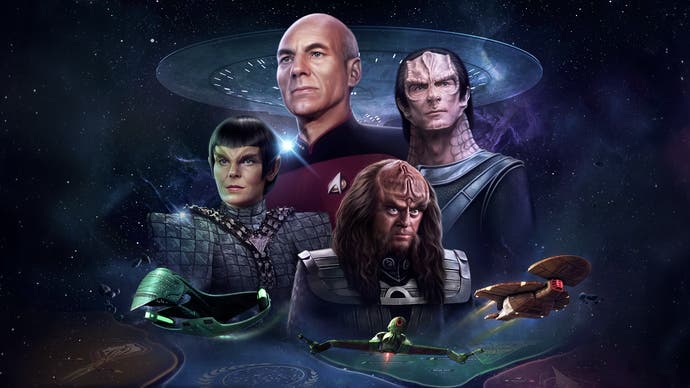Star Trek: Infinite review - it's a good day to wait for mods
Captain's slog.
As President T'Pragh of the United Federation of Planets, it's routine for me to hear from the USS Enterprise, the pride and joy of our fleet. It's another for the message sender to be tiresome prodigy Wesley Crusher, historical bearer of unwanted news. This time, Wesley isn't the problem. The problem is that the Federation doesn't even have the Enterprise yet - building the flagship is a milestone mission in the game, and at this current point in time, there is no possible Enterprise from which Ensign Crusher could be hailing me from. On an episode of The Next Generation, this could easily be a setup for a fun pocket dimension-themed episode or a time loop narrative, but it's not. This is the erratic world of Star Trek: Infinite, a grand strategy reskin of Stellaris that boldly goes to places that don't always make sense.
There are, in fact, two full-conversion Star Trek mods for Stellaris that have been around for years. This makes sense for a space strategy game largely defined by its intense mod scene, though Infinite is Paradox's first official Trek game. Grand strategy games and classic science fiction align beautifully for obvious reasons: both are full of bombastic moral posturing, self-righteous colonisation narratives, and big-picture civilisational themes that mostly end up being mindlessly subsumed into a desk marathon of bureaucratic reorganisation, unit micromanagement, and rote muscle memory. And while Paradox has done a much better job at engaging with its chosen source material than what Shiro Games did with the very forgettable Dune: Spice Wars 4X game (not to be confused with this now-defunct Dune Stellaris mod), the review version of Infinite still leaves much to be desired.
Featuring the Federation, Romulans, Klingons, or Cardassians as playable factions, Infinite kicks off around familiar Trek events, namely the immediate aftermath of the Khitomer Massacre and the impending explosion of the Romulan sun. There are more canonical milestones depending on your choices - if you play your cards right, you can even build everyone's favourite chaos zone, Deep Space Nine. The tutorial starts you off as the Federation, probably the most familiar way to navigate the byzantine crucible of playing Stellaris for the first time (or even the fifth time - it's a monster). But going the way of the Federation is the least imaginative way to live amongst the stars, spreading hyper-bureaucratic vibes and perfunctory diplomacy with fake hellos and soft handshakes; I had a much better time as Cardassians and Romulans, not just because I could play two wildly indulgent flavours of sociopathic asshole, but because there's a lot more room to have fun without the burden of being the galaxy's most self-important good guy.
In a just world, nobody should have to learn Stellaris to play a Star Trek strategy game, but in this world, my love for Trek had me do my best in a week. But long-game space strategy isn't unique to Star Trek, nor should it be synonymous with the franchise. Many of Star Trek's finest moments aren't showy combat manoeuvres, but bizarrely relatable stories about hubris and humanity that form the living, beating heart of its whole identity. To this end I can think of dozens of Trek game ideas that I'd love to play that don't involve grand strategy: Riker's Pleasure Cruise in the style of Leisure Suit Larry, an anarchic Ro Laren RPG, a mok'bara fighting game, Miles and Keiko O'Brien marriage simulator, a Darmok and Jalad-inspired translation mystery, Ferengi union simulator, Lwaxana Troi gets her groove back (which I did sort of do via the very good Discord RPG Strangers on the 'Net). The core flavour of Star Trek, no matter the game format, simply isn't about cataloguing ships and making spreadsheets to be the best little pencil-pusher you can be, no matter how much you internalised the robotic savant-heroism of Ender's Game as a child.
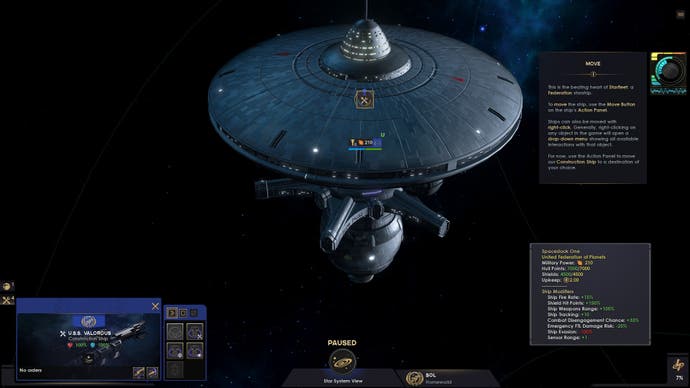
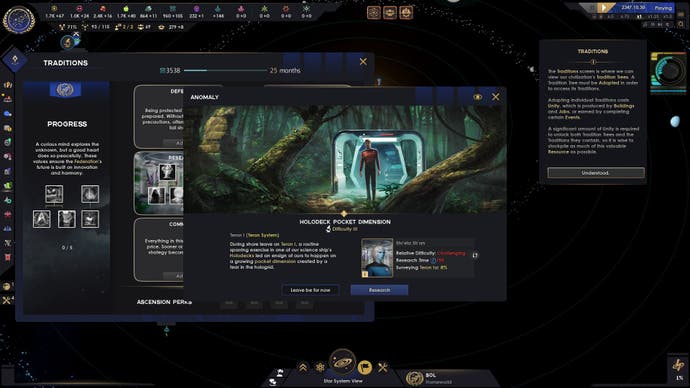
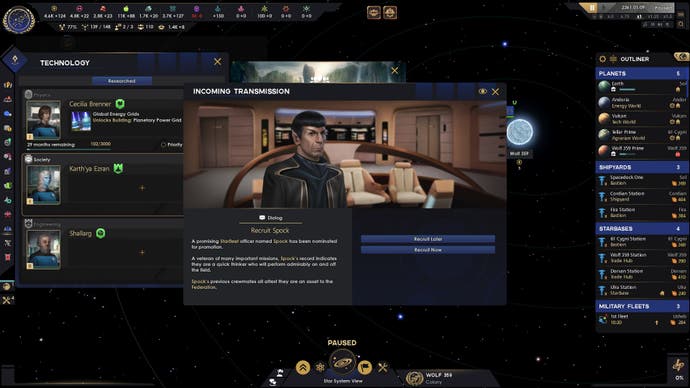
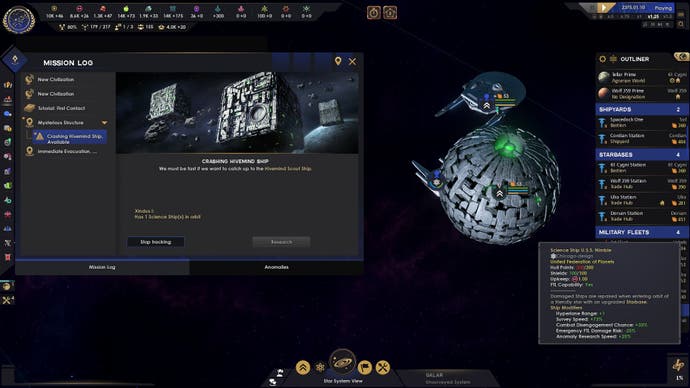
Infinite's writing does invoke some of that classic Trek goofiness and heart, where each faction is sufficiently well-defined with all the requisite fan service mentions and corny jokes (there are even some goofs with a cat on an away mission - sadly not Spot). Science ships will do routine surveys on faraway planets that involve a true-to-Trek range of civilisational tragedy, potentially dangerous flora, inexplicable phenomena, and major scientific breakthroughs. At home, your governors will throw festivals to stabilise new colonies and investigate mysterious anomalies that affect the local settlers. Some of your officers will be complacent and lazy, while others will go above and beyond to succeed. Romulans will be appropriately high on their own superiority, and Cardassians appropriately genocidal against the Bajorans. This is the way of Star Trek.
To expect these things from an official Trek-themed game is the bare minimum, especially since Trek is a landmark pop culture behemoth that has always been, for better or worse, wholly engaged with its own lore. Infinite can't seem to decide whether it's a loose reimagining or full-fledged Trek doctrine, even when all of its narrative milestones - building the Enterprise, neutralising the Borg, liberating Bajor - are rooted firmly in canon. As a result, it oscillates between both without real spirit or conviction. Its chain event arcs feel like half-baked efforts to reimagine said canon without context or nuance; the latter is certainly not something you tend to find in grand strategy, but it is a defining part of the Star Trek brand.
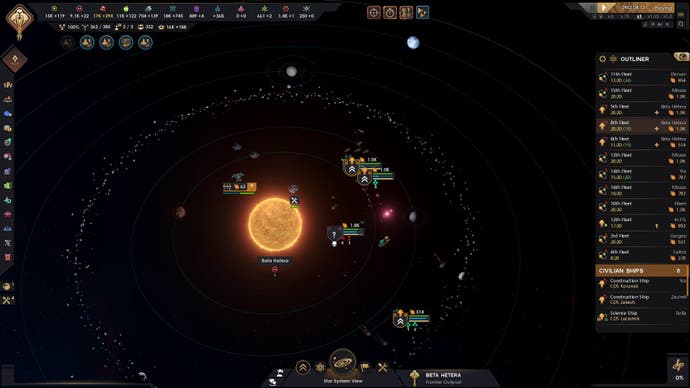
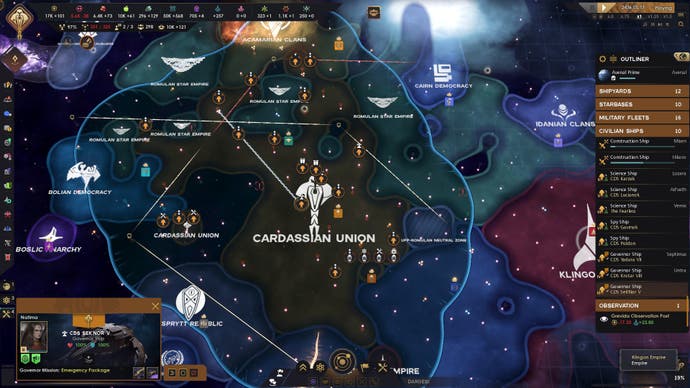
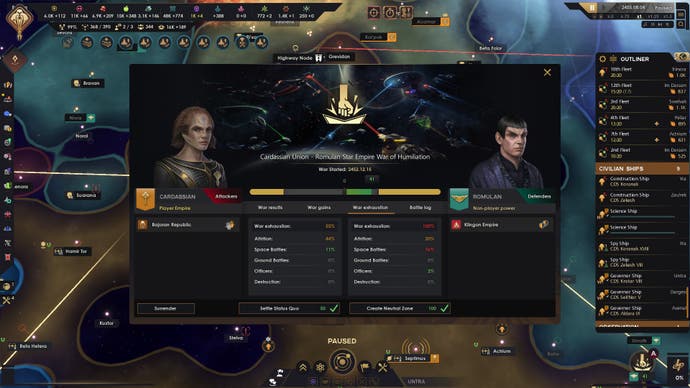
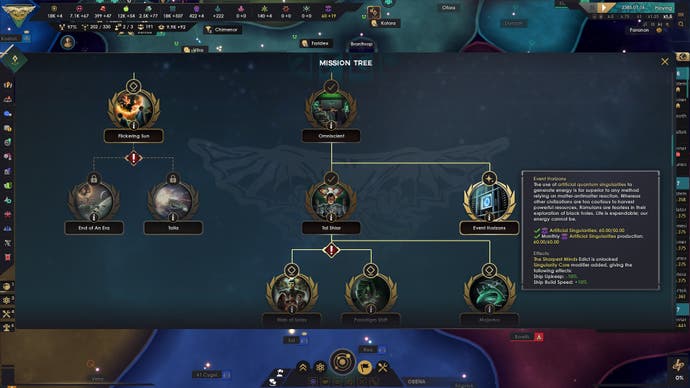
In my Cardassian playthrough, Captain Janeway shows up to save the day - a plausible scenario given that the Federation prioritises the galactic good, regardless of who's involved. But after the problem is addressed, she inexplicably continues to work as an ordinary scientist for Cardassia. It's simply wild that I can go about exterminating Bajorans while Janeway, a Starfleet officer to the bone, works on technology to help me do genocide better. The fact that Cardassia can "improve relations'' with Bajor using the same diplomacy methods as everyone else echoes how Shiro Games' Dune: Spice Wars gave little thought to how and why the Fremen should have an inherently different playstyle from their colonisers. When examining a primitive race with a Cardassian observation post, Infinite reminds me that engaging with them will break the prime directive - a unique Starfleet code of conduct that doesn't apply to Cardassia in any way. If you're trying to draw a player into a rich narrative world known for examining social issues, these things matter - otherwise you're better off just playing with well-established Trek mods.
Then there's the Stellaris of it all - a godless trajectory of trial and error that only pays off for the most patient and determined souls. One of Infinite's victory conditions involves acquiring 12 civics - the core principles that define a faction's way of life. I'm admittedly new to Stellaris, but even I understand that getting 12 is impossible in a prelaunch review build; like vanilla Stellaris, everyone in Infinite starts off with two civics, and with a lot of luck and fumbling through the infamous randomised technology system (there is no real tech tree, and you can't fully visualise your overall progress without mods), you can claw your way to maybe three or four civics in the late game. In my longest playthrough as Cardassia, I observed the Federation gain five civics, a mystery that will forever remain unresolved. If Infinite is so explicit about administrative excellence and bureaucratic order being the backbone of a functioning empire, perhaps they should apply more of this basic logic to the player experience.
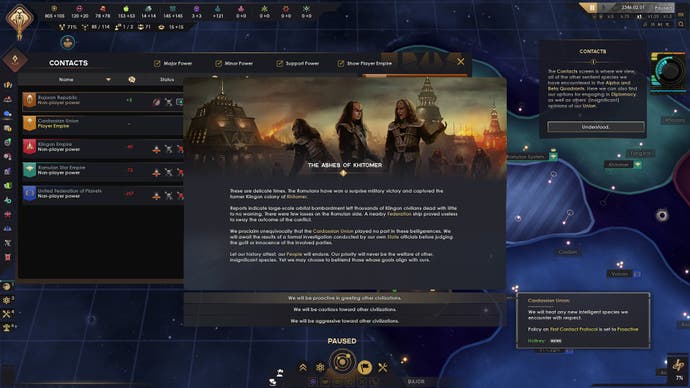
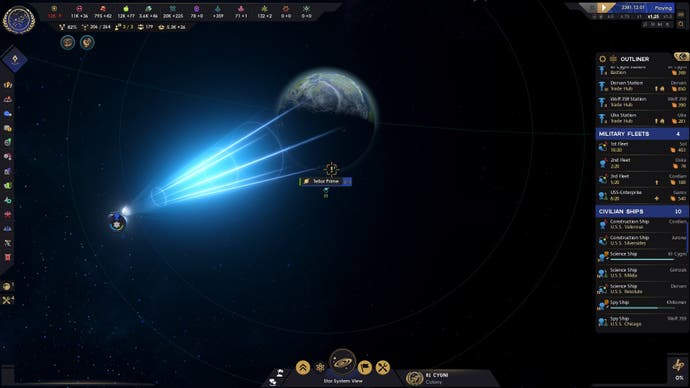
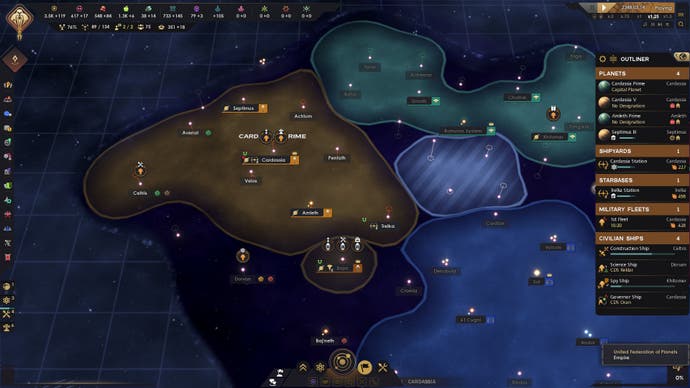
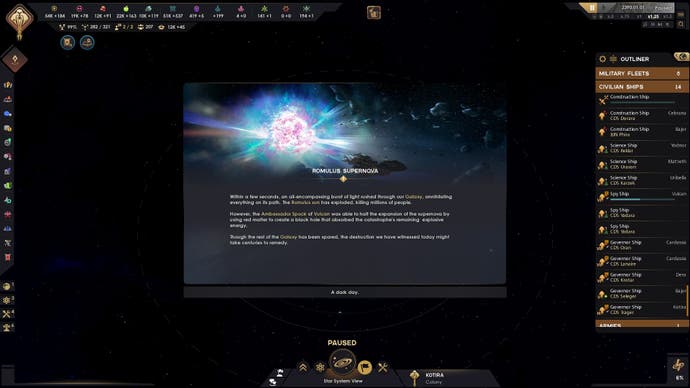
At the end of it all, after I've sampled three of four factions and hit a wall with all of them, my brain feels like spoiled brill cheese. There are momentary laughs in getting odious characters like Gul Dukat killed in action, but those fleeting pleasures are quickly swallowed by the gaping maw of time. I come away from Infinite with a familiar feeling that I think of as sunk-cost Stockholm syndrome cultivated from dozens of hours and tight learning curves devoted to the hope of victory; this is the self-inflicted masochistic misery borne by anyone who enjoys these types of games, but the difference here is that I can't see myself returning to Infinite for pleasure, at least not without multiple patches and mods.
Despite getting the overall tone and general presentation right for an official Trek endeavour, right now Infinite feels more like a hasty answer to the existing popularity of the Stellaris Trek mods and a quick IP adaptation, rather than a fresh experience that fully capitalises on the source material beyond "power struggles with spaceships." I think at this point we're all withering under the avalanche of iffy Trek reboots and spinoffs, and Infinite belongs squarely in this cavalcade of nostalgia. I'm sure that in time there will be the requisite "quality of life" improvements and possibly a more thoughtful overhaul that figures out whether we're in for a play-by-play retelling of canon, like watching old Holodeck war simulations, or something that actually takes advantage of the medium to tell new stories. For now, my appetite for victory has been put on pause, even as deranged Cardassia; where grand strat fans might insist that there are five lights because Stellaris is supposedly the perfect framework upon which to hang a Starfleet uniform, the truth is that its current incarnation really just has four.
A copy of Star Trek: Infinite was provided for review by Paradox Interactive.
